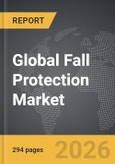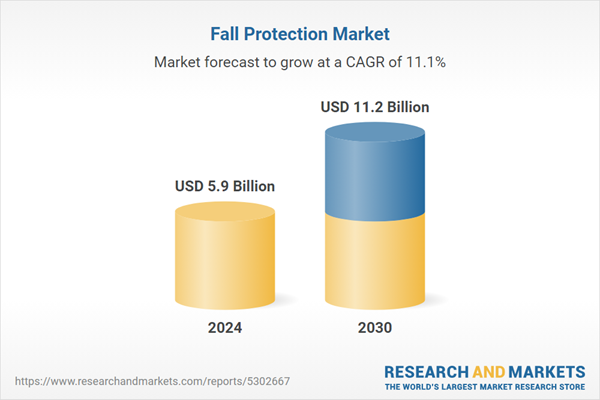Global Fall Protection Market - Key Trends & Drivers Summarized
What Is Driving the Demand for Fall Protection Solutions?
The demand for fall protection systems is increasing across industries that prioritize workplace safety, such as construction, oil and gas, manufacturing, and mining. Fall protection solutions encompass a wide range of equipment, from harnesses and lanyards to anchor systems and guardrails, designed to safeguard workers against fall-related injuries and fatalities. With stringent occupational safety regulations worldwide, organizations are required to adhere to specific safety standards, driving demand for certified fall protection systems. In the construction sector, for example, where falls remain one of the leading causes of workplace injuries, implementing robust fall protection measures is essential for compliance and worker safety. Companies are investing in advanced fall protection equipment not only to meet regulatory standards but also to reduce insurance costs and increase worker morale by ensuring a safer work environment.Beyond meeting regulatory standards, advancements in fall protection technology are fueling adoption as industries seek solutions that are both effective and user-friendly. Innovations such as self-retracting lifelines, smart safety harnesses equipped with sensors, and anti-slip guardrails offer higher levels of safety and convenience for workers. These innovations are particularly relevant in dynamic environments where workers are frequently exposed to fall hazards, such as high-rise construction, scaffolding, and confined spaces. As companies continue to prioritize worker well-being, the fall protection market is expanding to incorporate systems that are adaptable to various job site needs. By improving both functionality and safety features, manufacturers are creating products that cater to the growing demand for comprehensive fall protection solutions.
How Are Technological Advancements Shaping the Fall Protection Market?
Technological advancements are transforming the fall protection market by introducing smart, data-driven safety solutions. New-generation safety harnesses and lanyards equipped with IoT sensors can detect worker movements and alert supervisors when unsafe conditions are detected. For instance, if a worker slips or enters a restricted area without proper fall protection equipment, sensors within the harness can send real-time alerts to site supervisors, enabling immediate intervention. Additionally, wearable technology is being integrated into fall protection gear, enabling remote monitoring of workers' physiological conditions, which adds an extra layer of safety by detecting signs of fatigue or heat stress that could contribute to fall risks. These technological advancements are highly valuable in environments with high-risk factors, such as oil platforms, high-altitude work sites, and construction scaffolding.Furthermore, developments in materials science have led to the creation of lighter, more durable fall protection equipment that enhances both safety and comfort for workers. Traditional fall protection systems were often bulky and limited workers' mobility, but modern equipment uses advanced materials like high-strength webbing and corrosion-resistant metals, making it easier for workers to move freely while remaining secure. Additionally, cloud-connected platforms allow companies to track fall protection gear usage, maintenance schedules, and compliance records, creating a comprehensive safety management system. By incorporating technology into fall protection systems, manufacturers are not only enhancing safety but also making compliance easier to manage, resulting in a safer and more efficient workplace.
What Role Do Industry-Specific Needs Play in the Growth of the Fall Protection Market?
Fall protection requirements vary significantly across industries, influencing the demand for customized safety solutions. In the construction industry, fall protection is critical due to the prevalence of high-risk tasks like roofing, scaffolding, and working on elevated platforms. Consequently, construction companies are investing heavily in advanced fall protection systems, such as guardrails, harnesses, and anchor points, to ensure worker safety and regulatory compliance. In the oil and gas sector, where workers often operate in remote and elevated environments, there is a heightened demand for highly durable and reliable fall protection solutions. This sector requires equipment that can withstand extreme temperatures, corrosion, and hazardous conditions, driving manufacturers to develop specialized products tailored for the unique challenges faced by oil and gas workers.The telecommunications and utilities industries are also key drivers of fall protection market growth. These sectors involve work on towers, utility poles, and elevated platforms, where falls pose a significant safety risk. Consequently, companies in these sectors are seeking innovative fall protection systems that offer maximum safety while allowing for the high mobility required in such environments. Furthermore, industries such as aerospace and wind energy have complex fall protection needs, as workers often perform tasks in confined spaces or at significant heights. The diversity of industry-specific requirements highlights the demand for fall protection solutions that can be adapted to meet the specific challenges of each sector, fostering product innovation and customization in the market.
What Factors Are Driving Growth in the Fall Protection Market?
The growth in the fall protection market is driven by a convergence of regulatory enforcement, technological innovation, and a growing awareness of workplace safety. Government regulations in various regions, including OSHA standards in the United States and similar guidelines in the EU and APAC regions, mandate the use of certified fall protection equipment across industries, pushing companies to invest in compliant safety solutions. These regulations are especially stringent in industries with high-risk work environments, creating a significant demand for reliable fall protection systems. Additionally, technological advancements in wearable safety technology, sensor-enabled equipment, and real-time monitoring systems are accelerating market growth, as companies adopt solutions that offer both enhanced safety and operational efficiency.Worker safety and corporate reputation are also driving factors, with organizations increasingly prioritizing investments in fall protection to minimize workplace accidents and enhance employee trust. As workplace injury prevention becomes central to corporate social responsibility, many companies are implementing fall protection systems not only to comply with regulations but also to create a culture of safety. The trend towards lighter, ergonomic, and easy-to-use fall protection equipment has broadened the market's addressable base, making safety solutions more accessible for diverse applications. The convergence of regulatory mandates, technological advancements, and organizational commitment to safety is propelling the fall protection market forward, ensuring robust growth and innovation across sectors.
Report Scope
The report analyzes the Fall Protection market, presented in terms of market value (US$ Thousand). The analysis covers the key segments and geographic regions outlined below.- Segments: Segment (Soft Goods, Hard Goods, Installed Systems, Access Systems, Services); End-Use (Construction, Oil & Gas, Energy & Utilities, Telecom, Transportation, Other End-Uses).
- Geographic Regions/Countries:World; United States; Canada; Japan; China; Europe (France; Germany; Italy; United Kingdom; Spain; Russia; and Rest of Europe); Asia-Pacific (Australia; India; South Korea; and Rest of Asia-Pacific); Latin America (Argentina; Brazil; Mexico; and Rest of Latin America); Middle East (Iran; Israel; Saudi Arabia; United Arab Emirates; and Rest of Middle East); and Africa.
Key Insights:
- Market Growth: Understand the significant growth trajectory of the Soft Goods segment, which is expected to reach US$3.7 Billion by 2030 with a CAGR of a 11.9%. The Hard Goods segment is also set to grow at 10.7% CAGR over the analysis period.
- Regional Analysis: Gain insights into the U.S. market, valued at $1.5 Billion in 2024, and China, forecasted to grow at an impressive 14.6% CAGR to reach $2.6 Billion by 2030. Discover growth trends in other key regions, including Japan, Canada, Germany, and the Asia-Pacific.
Why You Should Buy This Report:
- Detailed Market Analysis: Access a thorough analysis of the Global Fall Protection Market, covering all major geographic regions and market segments.
- Competitive Insights: Get an overview of the competitive landscape, including the market presence of major players across different geographies.
- Future Trends and Drivers: Understand the key trends and drivers shaping the future of the Global Fall Protection Market.
- Actionable Insights: Benefit from actionable insights that can help you identify new revenue opportunities and make strategic business decisions.
Key Questions Answered:
- How is the Global Fall Protection Market expected to evolve by 2030?
- What are the main drivers and restraints affecting the market?
- Which market segments will grow the most over the forecast period?
- How will market shares for different regions and segments change by 2030?
- Who are the leading players in the market, and what are their prospects?
Report Features:
- Comprehensive Market Data: Independent analysis of annual sales and market forecasts in US$ Million from 2024 to 2030.
- In-Depth Regional Analysis: Detailed insights into key markets, including the U.S., China, Japan, Canada, Europe, Asia-Pacific, Latin America, Middle East, and Africa.
- Company Profiles: Coverage of players such as 3M Company, Buckingham Manufacturing Co Inc., Cofra S.R.L, ELK River Inc., Falltech and more.
- Complimentary Updates: Receive free report updates for one year to keep you informed of the latest market developments.
Some of the 42 companies featured in this Fall Protection market report include:
- 3M Company
- Buckingham Manufacturing Co Inc.
- Cofra S.R.L
- ELK River Inc.
- Falltech
- Frenchcreek Production, Inc.
- GF Protection Inc.
- Gravitec Systems, Inc.
- Hi-Rise Access
- Honeywell International Inc.
- Karam Industries
- Kee Safety, Inc.
- Malta Dynamics, LLC
- MSA Safety Inc.
- P&P Safety Ltd
- Rigid Lifelines Inc.
- Safe Approach Inc.
- Safetylink Pty Ltd.
- Sellstrom Manufacturing Company
- Skylotec GmbH
- Swelock Asia Co., Ltd.
- The Petzel Group
- Total Access (U.K.) Ltd.
- W.W. Grainger, Inc.
- Werner Co.
This edition integrates the latest global trade and economic shifts into comprehensive market analysis. Key updates include:
- Tariff and Trade Impact: Insights into global tariff negotiations across 180+ countries, with analysis of supply chain turbulence, sourcing disruptions, and geographic realignment. Special focus on 2025 as a pivotal year for trade tensions, including updated perspectives on the Trump-era tariffs.
- Adjusted Forecasts and Analytics: Revised global and regional market forecasts through 2030, incorporating tariff effects, economic uncertainty, and structural changes in globalization. Includes historical analysis from 2015 to 2023.
- Strategic Market Dynamics: Evaluation of revised market prospects, regional outlooks, and key economic indicators such as population and urbanization trends.
- Innovation & Technology Trends: Latest developments in product and process innovation, emerging technologies, and key industry drivers shaping the competitive landscape.
- Competitive Intelligence: Updated global market share estimates for 2025, competitive positioning of major players (Strong/Active/Niche/Trivial), and refined focus on leading global brands and core players.
- Expert Insight & Commentary: Strategic analysis from economists, trade experts, and domain specialists to contextualize market shifts and identify emerging opportunities.
Table of Contents
Companies Mentioned (Partial List)
A selection of companies mentioned in this report includes, but is not limited to:
- 3M Company
- Buckingham Manufacturing Co Inc.
- Cofra S.R.L
- ELK River Inc.
- Falltech
- Frenchcreek Production, Inc.
- GF Protection Inc.
- Gravitec Systems, Inc.
- Hi-Rise Access
- Honeywell International Inc.
- Karam Industries
- Kee Safety, Inc.
- Malta Dynamics, LLC
- MSA Safety Inc.
- P&P Safety Ltd
- Rigid Lifelines Inc.
- Safe Approach Inc.
- Safetylink Pty Ltd.
- Sellstrom Manufacturing Company
- Skylotec GmbH
- Swelock Asia Co., Ltd.
- The Petzel Group
- Total Access (U.K.) Ltd.
- W.W. Grainger, Inc.
- Werner Co.
Table Information
| Report Attribute | Details |
|---|---|
| No. of Pages | 294 |
| Published | February 2026 |
| Forecast Period | 2024 - 2030 |
| Estimated Market Value ( USD | $ 5.9 Billion |
| Forecasted Market Value ( USD | $ 11.2 Billion |
| Compound Annual Growth Rate | 11.1% |
| Regions Covered | Global |









